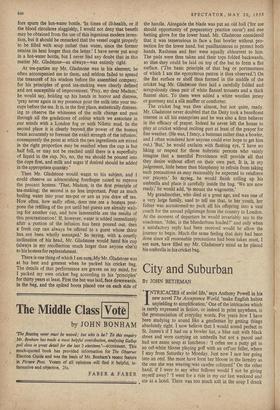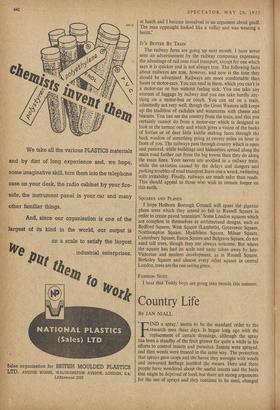City and Suburban
BY JOHN BETJEMAN i ' NTRICACIES of social life,' says Anthony Powell in his new novel The Acceptance World, 'make English habits unyielding to simplification.' One of the intricacies which is rarely expressed in fiction, or indeed in print anywhere, is the pronunciation of everyday words. For years now I have been studying to sound like a gentleman by getting things absolutely right. I now believe that I would sound perfect in St. James's if I had on a bowler hat, a blue suit with black shoes and were carrying an umbrella but not a parcel and had not eaten soup at luncheon : 'I orfen see a putty gel in an off-white bloose playing goff with an orf'ccr feller, where I stay from Saturday to Monday. Just now I saw her going into an otcl. She must have lorst her bloose in the larndry as the one she was wearing was cawfee coloured.' On the other hand, if I were to say what follows would I not be giving myself away? 'I went for a ride in my car last weekend and ate at a hotel. There was too much solt in the soup I drank The railway fares are going up next month. 1 have never seen an advertisement by the railway companies expressing the advantage of rail over road transport, except for one which says it is quicker and is not always true. The following facts about railways are true, however, and now is the time they should be advertised. Railways are more comfortable than buses or motor-cars. You can read in them, which you can't in a motor-car or bus without feeling sick. You can take any amount of luggage by railway and you can take hardly any- thing on a motor-bus or coach. You can eat on a train, admittedly not very well, though the Great Western still keeps up the tradition of radishes and watercress with cheese and biscuits. You can see the country from the train, and this you certainly cannot do from a motor-car which is designed to look at the tarmac only and which gives a vision of the backs of lorries or of dear little kiddiz making faces through the back window of something going at twenty miles an hour in front of you. The railways pass through country which is open and pastoral, while buildings and hideosities spread along the main road farther out from the big towns than they do along the main lines. Your nerves are soothed in a railway train, while the anxieties caused by the delays and dangers and parking troubles of road transport leave one a wreck, twittering with irritability. Finally, railways are much safer than roads. This should appeal to those who wish to remain longer on this earth.











































 Previous page
Previous page